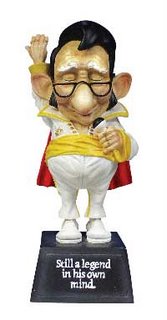Celebs: Legends in Their Own Minds
 Individuals with narcissistic tendencies appear to be attracted to the entertainment industry – rather than the industry creating narcissists, says USC study.
Individuals with narcissistic tendencies appear to be attracted to the entertainment industry – rather than the industry creating narcissists, says USC study.By James Grant
Celebrities have more narcissistic personality traits than the general population, and people with narcissistic tendencies seem to be attracted to the entertainment industry rather than the industry creating narcissists, according to a study by researchers Drew Pinsky of the Keck School of Medicine of USC and S. Mark Young of the USC Marshall School of Business and the USC Annenberg School for Communication.
The study, which will be published in the Journal of Research in Personality (Elsevier), is the first systematic, empirical and scholarly study of celebrity personality and was based on a standardized test of narcissistic personality traits administered to 200 celebrities.
“The general public’s understanding of celebrity personality is based largely on anecdotal information such as media interviews,” Young said. “We conducted this study as part of a larger program of research to provide more scientific evidence on what the celebrity personality is really like.”
The authors say they chose narcissism as the topic of the study because it is one of the most widely discussed characteristics of celebrities.
“Narcissists generally crave attention, are overconfident of their abilities, lack empathy and can evince erratic behavior,” said Pinsky, an assistant clinical professor of psychiatry at USC. “However, they are also well-liked, especially on first meeting, are extroverted and perform well in public.”
To conduct their research Pinsky and Young employed a well-validated personality research instrument, the Narcissistic Personality Inventory (NPI), which has been used by researchers for more than two decades.
The NPI test divides narcissism into seven components: superiority, exhibitionism, entitlement, vanity, authority, exploitiveness and self-sufficiency.
The authors found that the celebrities participating in the study had statistically significantly higher narcissism scores compared to aspiring business leaders (MBA students) and the general population. Reality TV personalities had the highest overall narcissism scores when compared with actors, musicians and comedians.
And while men are more likely than women to evince narcissistic traits in the general population, the authors found that among celebrities, females were more narcissistic than their male counterparts.
“Our research also shows that many celebrities exhibit narcissistic behavior prior to becoming famous, which could indicate a self-selection bias for the entertainment industry by certain personality types,” said Young, who holds the George Bozanic and Holman G. Hurt Chair in Sports and Entertainment Business at USC.
“Knowing that many celebrities have narcissistic tendencies may allow entertainment industry decision makers such as studio executives, producers, directors, agents, publicists and casting agents to work with them more effectively,” Young explained. “It may also provide greater insight into celebrity behavior for the general public.”
The research data were collected anonymously and confidentially from celebrities selected at random during guest appearances on the nationally syndicated Westwood One radio show “Loveline,” based at the KROQ-FM radio station in Los Angeles.
The celebrities were administered the NPI test during breaks on the show, which Pinsky has hosted for the past 20 years.

<< Home